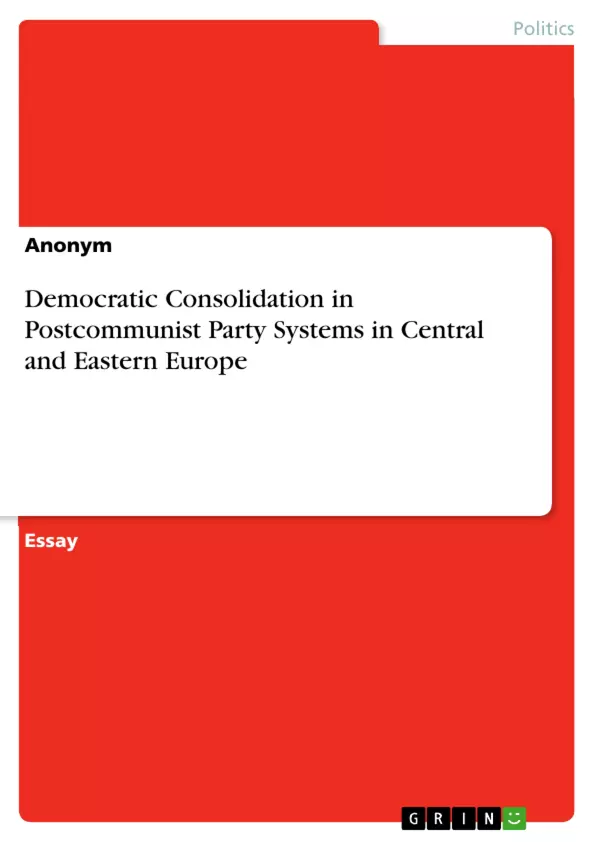In this paper, the stability of party and government systems in the "new" member states of the European Union from Central and Eastern Europe is investigated, as well as the process of democratic consolidation in those countries. The research aim is to examine how significant the discrepancies between the established Western democracies and the postcommunist EU members still are, three decades now after the system transformations in the early 1990s. Besides the rather broad comparison between West and East, variances among the different postcommunist states and over time is examined.
For this purpose, a literature review is made by summarizing and then comparing the findings of multiple authors, before an own evaluation of current data from the Bertelsmann Transformation Index (BTI) is made. In the end, the main conclusion of this paper is that there are similarities as well as differences between the "old" and the "new" EU member states thirty years after the collapse of communism. In terms of government stability and democratic consolidation, however, the considerable differences mainly do not exist on an interregional, but rather on an intraregional level, given the significant variance among the postcommunist states. Therefore, the results are not completely unambiguous, leading to the necessity of further research in this field.
Inhaltsverzeichnis (Table of Contents)
- Introduction
- Theoretical Framework
- Methodological Approach
- Empirical Analys
- Government Stability in Central and Eastern Europe
- Democratic Consolidation in Central and Eastern Europe
- Conclusion
Zielsetzung und Themenschwerpunkte (Objectives and Key Themes)
This paper investigates the stability of party and government systems in the 'new' member states of the European Union from Central and Eastern Europe, as well as the process of democratic consolidation in those countries. The research aim is to examine the discrepancies between the established Western democracies and the postcommunist EU members three decades after the system transformations in the early 1990s. The research compares the experiences of Western and Eastern Europe, and analyzes variances among the different postcommunist states over time.
- Government stability in postcommunist EU member states
- Democratic consolidation in postcommunist EU member states
- Comparison of Western and Eastern European party and government systems
- Variances among different postcommunist states over time
- The role of political institutions in the consolidation process
Zusammenfassung der Kapitel (Chapter Summaries)
The introduction provides an overview of the research context and the historical background of the 'new' EU member states from Central and Eastern Europe. It highlights the question of whether these countries have successfully transitioned to stable democracies and discusses the research focus on comparing these states with Western European democracies.
The theoretical framework section delves into existing research on party and government systems in postcommunist Europe, highlighting the lack of systematic comparative data and examining different perspectives on government stability. The chapter discusses key works by authors like Florian Grotz, Ferdinand Müller-Rommel, Courtenay Ryals Conrad, Sona N. Golder, and Wolfgang Merkel, which provide insights into the complexity of democratic consolidation in postcommunist societies.
The methodological approach chapter outlines the research methodology based on a literature review of the previously discussed studies. The chapter emphasizes the comparison of findings from different sources and the analysis of data from the Bertelsmann Transformation Index (BTI) to assess the current status of democratic consolidation.
Schlüsselwörter (Keywords)
The key terms and topics addressed in the paper include government stability, democratic consolidation, party systems, postcommunist transition, Central and Eastern Europe, Western democracies, comparative politics, Bertelsmann Transformation Index (BTI), and political institutions.
- Arbeit zitieren
- Anonym (Autor:in), 2020, Democratic Consolidation in Postcommunist Party Systems in Central and Eastern Europe, München, GRIN Verlag, https://www.hausarbeiten.de/document/1388995


